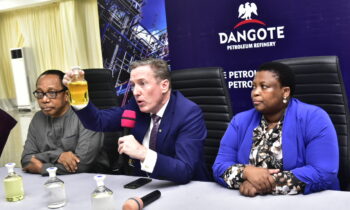
…hints of Train 8
Olusola Bello
The Nigeria Liquefied Natural Gas (NLNG) Limited has outlined key strategies that would enable it in its decarbonisation and emission reduction schemes in Nigeria.
It stated that as a company, its mission is to help to reduce emissions, help decarbonise, and it is staying through to the vision even though it now recognizes that the vision is bigger than it.
According to the company, it has been able to reduce gas flaring from more than 65 percent to less than 20 percent in Nigeria.
Adeleye Falade, general manager, operations, NLNG, who spoke at the ongoing Nigeria International Energy Summit (N.I.E.S) taking place in Abuja, said, if people are talking about decarbonisation, then, NLNG has been in transition which was the topic of discussion.
He said the last 30 year has been a thing of pride for the company on account of what it has done, stating that when people talk about the company, they think about it much more around the value it has added in terms of the economics.
“For the period it has been operating, which is about 22years, the company has generated revenue in excess of $116bn, paid over $ 6.5 billion as tax, shareholder dividend is over $16billion, paid to Federal Government as payment for gas feeds is in excess of $13bn. So these are what people remember us for,” he said.
“But for us, it is more about the value we create in keeping our environment clean, and this is what the NLNG would continue to do,” he said.
He disclosed that the company got into cooking gas business which it started advocating for since 2007. “It started by deploying 50,000 metric tons into the Nigerian market and progressively that number has been going up to the extent that last year the company hits 400,000 metric tons, which was produced and supplied to the domestic market.
“Last year the board gave the company the go ahead to increase the supply to 500,000 metric tons.”
Cooking gas, he stated, reduces deforestation. “Charcoal is used by a number of women to cook food and this is part of what is contributing to emission.”
“So when we go back to our mission as a company that is helping to build a better Nigeria, we couldn’t see anywhere else that we could find expression than just helping to create cleaner fuel and saving lives.”
Saving lives, because statistics indicate that every year about 100,000 Nigerians die from emissions. This role, he said, the company would continue to play, stating further that it makes it feel proud of building a better Nigeria.
Last year, the company signed three sales and purchase agreements (SPAs) for NLNG to be deployed into the domestic market. This is aimed at increasing the consumption of domestic gas and LNG, he said.
“We are doing this because we recognize that the more we do it, the more we reduce the issue of emission and the more we continue to transit. This is on the macro level. When you come to the micro level, even in the plant itself, we have our greenhouse target, we have greenhouse energy management plan that spells out critical milestones that are reported to the board where we are measured. We have our flaring target, which we have been monitoring over the years on a continuous basis, it is continually reduced. But when marked against other companies, we are trailing well below what the global level is.”
The general manager operations said the company will continue to deploy technology to continue to reduce emissions further.
As a company, he said: “The mission was to have a company that would help to reduce emission, help decarbonise the country, and we stay through to the vision, but we recognize it is a vision that is bigger than us.
“So for the next 30 years, we have started scouting studies and we are looking at train 8. But the way we are looking at train 8 is not the conventional way of just increasing capacity, but the one that helps us reduce our overall greenhouse gas emission as a plant.”




